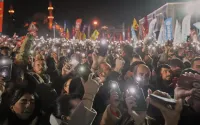17 March 2005Liz Sidoti
The House on Wednesday approved an $81.4 billion emergency spending package for combat and reconstruction in Iraq and Afghanistan, which would push the total cost of the wars beyond $300 billion.
| How Did Your US Representative Vote?Roll Call 77 - HR 1268 - Emergency Spending Package for Combat and Reconstruction in Iraq and Afghanistan |
The legislation is the fifth emergency spending plan Bush has sent to Congress for wars since the Sept. 11, 2001 terrorist attacks. It provides $76.8 billion for defense-related expenses and, overall, is roughly $500 million less than the president's request.
In a statement, Bush said the House passage showed a "strong bipartisan support for our troops and for our strategy to win the war on terror."
"The people of Iraq and Afghanistan are building new democracies and defying the terrorists, and America is standing with them," he said.
In a setback for the White House, the House trimmed president's request for Afghan reconstruction projects and State Department programs and prohibited any money in the bill from being used to build a sprawling U.S. embassy in Baghdad, despite intense lobbying by Secretary of State Condoleezza Rice.
The moves sent a signal to the president that while lawmakers would give troops what they needed, emergency spending packages for the war should only be used to pay for urgent matters.
"The reason for this supplemental is to provide as quickly as possible money flows in support of our troops," Rep. Jerry Lewis, R-Calif., the chairman of the Appropriations Committee, said in urging passage.
The White House said in a statement that while it supports the bill as a whole, the president is concerned that the legislation does not adequately pay for matters deemed urgent by the administration, including the State Department programs.
U.S. diplomatic officials in Iraq currently are working out of one of Saddam Hussein's former palaces and the White House says a fortified U.S. embassy in Iraq is needed immediately. "Postponing construction will delay moving our people into more safe, secure and functional facilities," the White House said.
Excluding the latest spending package, Congress has approved $228 billion since the 2001 terrorist attacks for the two wars, the Pentagon's other efforts to hunt terrorists and rebuilding Iraq and Afghanistan. That's according to tracking by the nonpartisan Congressional Research Service, which writes reports for Congress.
The bulk of the money in bill the House passed Wednesday would go to the Army and the Marine Corps, the two service branches bearing the brunt of the war fighting. It would be spent for body armor, medical supplies, night-vision devices, communications equipment, weapons, ammunition and armor kits for combat vehicles. The legislation also increases the one-time death benefit for survivors of troops killed while on duty to $100,000 from $12,000.
The House bill provided $1.8 billion more for defense costs than the president had requested, reflecting a commitment on the part of both Republicans and Democrats to support U.S. troops.
As debate got under way on the bill Tuesday, the House added $100 million for disaster relief and famine assistance for the Sudan through an amendment sponsored by Rep. Jesse Jackson Jr., D-Ill.
Other spending in the bill includes:
$656 million in direct assistance for relief and long-term reconstruction for Indian Ocean countries recovering from the December tsunami and $222 million to replenish U.S. military accounts tapped earlier for initial tsunami aid. $590 million to train police and battle narcotics in Afghanistan. $580 million for international peacekeeping missions, most of which is for Sudan. $200 million in economic assistance for the Palestinian Authority.






